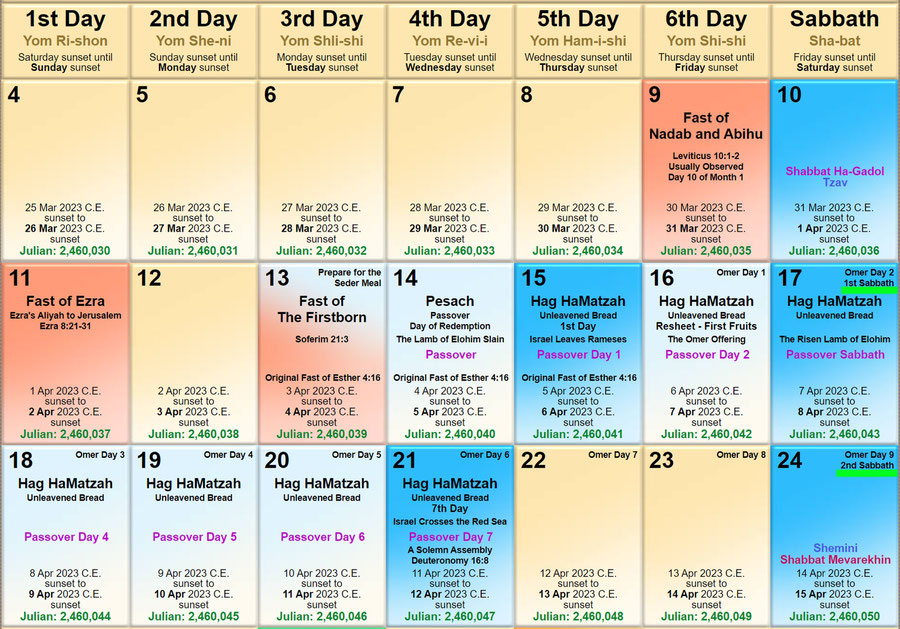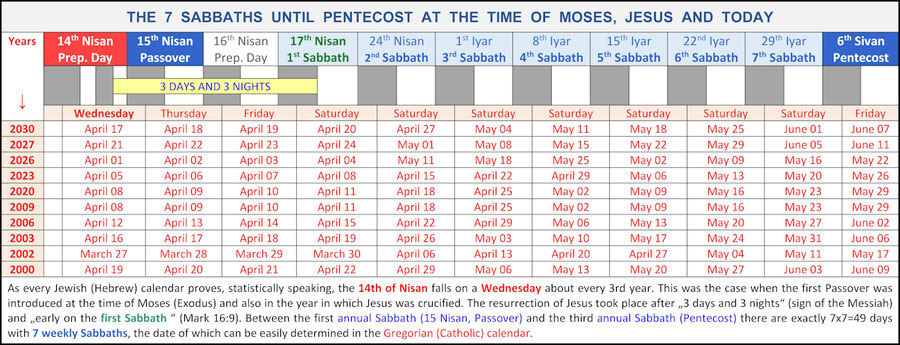- Home
- English
- Structure of the Bible
- Structure of the Menorah
- Ancient Menorahs
- Calendar and Feasts
- Resurrection on Sabbath
- Introduction
- Day
- Sabbath
- High Sabbath
- Pre-Sabbath
- Week
- Interlinear Bible
- Church Opinions
- 1. No Sunday
- 2. A Sabbath
- 3. No Friday
- 4. Intermediate Day
- 5. Three Days and Three Nights
- 6. Manipulations
- 6.1 Sabbath not Sunday
- 6.2 Plural σαββατων not week
- 6.3 one not first
- 6.5 Day of the Sabbaths
- 6.7 Lords Day
- 7. Old Bibles
- Greek Bibles
- Latin Bibles
- Gothic Bible
- English Manuscripts
- English Bible Prints 1
- English Bible Prints 2
- English Bible Prints 3
- English Bible Prints 4
- German Manuscripts
- German Bible Prints 1
- German Bible Prints 2
- Spanish Bibles
- Italian Bibles
- Swedish Bibles
- μια των σαββατων
- Mt 28-1
- Mk 16-2
- Mk 16-9
- Lk 24-1
- John 20-1
- John 20-19
- Acts 20-7
- 1Cor 16-2
- Lk 18-12
- 7 Languages
- Palm Sabbath
- Omer
- Summary
- The Rapture
- Rabbi Kaduri Note
- 666
- 888
- Video
- Info
- Historic Bibles Facsimiles
- Francais
- Deutsch
- Espanol
- Dutch
- Ελληνική
- Pусский
THE BIBLICAL CALENDAR AND BIBLICAL FEASTS 2023
The following illustration shows the first three biblical feast days (High Sabbaths) according to the astronomical and biblical calendar of God 2023, in which each month begins with the first visible crescent moon (new light) over Jerusalem, and the mathematical Jewish calendar 2023, which is used in Israel. The year 2023 offers a special feature because, as in 2020, the first feast days in both calendars fall on the same days. This means that any online Jewish calendar can show how the 50 days between Passover (Nisan 15) and Pentecost (the 50th day) are calculated. As the 14th of Nisan fell on a Wednesday again in 2020 and 2023, both calendars correspond in the sequence of weekdays exactly to the year in which Jesus was crucified (see Resurrection on Sabbath).
Feast Days in the Jewish and Biblical Calendar 2023
In 2023, the first 3 biblical feast days in spring/summer fall on the same feast days in both calendars. First the Jewish feasts of Israel are mentioned (red), the bold marked data correspond to the calendar of God. They are correct and independently confirmed by Christians worldwide (e.g. TorahCalendar.com):
1.) Passover 1 (Nisan 15): Wed/Thu, 05/06 April 2023 [5783] - Wed/Thu, 05/06 April 2023
2.) Passover 7 (Nisan 21): Tues/Wed, April 11/12 [5783] - Tues/Wed, April 11/12, 2023
[Second Passover (Iyar 14): Thu/Fri May 04/05 [ 5783] - Thu/Fri May 04/05]
3.) Pentecost (Sivan 6): Thu/Fri, May 25/26, 2023 [5783] - Thu/Fri, May 25/26, 2023
4.) Day of Trumpets (Yom Teruah, Tishri 1): Fri/Sat, Sept 15/16, 2023 [5784] - Sat/Sun, Sept 16/17, 2023
5.) Day of Atonement (Yom Kippur; Tishri 10): Sun/Mon, Sept. 24/25, 2023 [5784] - Mon/Thu, Sept. 25/26, 2023
6.) Feast of Tabernacles (Sukkot; Tishri 15): Fri/Sat, Sept. 29/30, 2023 [5784] - Sat/Sun, Sept. 30/Oct. 1, 2023
7.) Last Great Day (Shemini Atzeret; Tishri 22): Fri/Sat, Oct 06/07, 2023 [5784] - Sat/Sun, Oct 07/08, 2023
The Counting of the Omer in the Torah Calendar 2023
Many free online calendars 2023 show the 14th of Nisan on a Wednesday and the „first Sabbath“ (Mark 16:9) on the 17th of Nisan. Below is an example from TorahCalendar showing the counting of the 50 days to Pentecost and the 7 weekly Sabbaths between Passover (15th Nisan) and Pentecost (50th day):

The Counting of the Omer in the Jewish Calendar 2023
The following illustration shows how the 7 weekly Sabbaths (with the „first Sabbath“ on 17 Nisan; Mk 16:9) and the 50 days until Pentecost are counted in the Jewish calendar 2023. This was also the case in the year in which our Lord Jesus Christ was crucified. This is no secret and no insider knowledge, but every free online Jewish calendar 2023 shows this same arrangement and counting of the days until Pentecost:
Jesus' last Passover and the Passover of 2023. Again, Nisan 14 falls on Wednesday in the biblical and Jewish calendars, and the "first Sabbath" falls on the 17th of Nisan. Consequently, there is the same sequence of days in 2023 as in the year Jesus was crucified. The figure on the right shows the counting of the 7 weekly Sabbaths that exist in every Jewish online calendar.
Passover 2023 compared to the Passover at the time of Jesus



Approximately every third year, the 10th of Nisan (the day of the separation of the lamb) falls on a Sabbath (Saturday), rarely on a Sunday. The 14th of Nisan (the day of the sacrifice of the Lamb) is then in the middle of the week (Wednesday), the High Sabbath on the 15th Nisan (Thursday) and the „first Sabbath“ (Mark 16:9) in the count of the 7 weekly Sabbaths until Pentecost is on the 17th of Nisan. This was also the year in which our Lord Jesus Christ was crucified and resurrected after „3 days and 3 nights“, thus fulfilling the sign of the Messiah.
In the years 2020 and 2023, God's exact astronomical calendar (see Leviticus 23) and the imprecise mathematical Jewish calendar (from the 4th century AD) fell on the same days. This means that every biblical calendar (e.g. TorahCalendar) and Jewish online calendar can confirm the Palm Sabbath (Shabbat Ha-Gadol = the Great Sabbath) and show the count of the 50 days to Pentecost with the same Gregorian date:
More Info: Shabbat ha-Gadol on Nisan 10 and Palm-Sabbath
In the year of Jesus' crucifixion there was no „Palm Sunday,“ but rather a „Palm Sabbath“.

The 7 Sabbaths between Passover and Pentecost 2023
The following table shows the counting of the 7 weekly Sabbaths in 2023 in the Jewish calendar. It also shows the other years in which the 10th Nisan falls on a Sabbath (Shabbat ha-Gadol), the 14th Nisan (preparation day) on a Wednesday, the 15th Nisan (High Sabbath) on a Thursday and the 17th Nisan on the „first Sabbath“. All dates correspond to the Jewish calendar, which differs from God's calendar in some years.

Name and Date of the 7 High Sabbaths 2023
The 4 Fall Festival Days
In the 7th month of Tishri, God has commanded that the last 4 High Sabbaths of the year be celebrated. On the 1st Tishri is the Day of Trumpets (Yom Teruah), on the 10th day is the Day of Atonement (Yom Kippur) and from the 15th Tishri the Feast of Tabernacles begins, which ends with the last High Sabbath of the year, the Last Great Day (Shemini Atzeret) on the 22nd Tishri. .
Tisha B'Av and Tu B'Av 2023
In the 5th month of Av there are two more festivals, which are not part of the 7 High annual Sabbaths commanded in the Torah, but these festivals have developed over time and are still celebrated in Israel today.
The Purim Feast in the 12/13th Month
Purim is always celebrated at the end of each biblical year in the 12th/13th month. As the imprecise Jewish calendar adds a leap month (13th month, Adar II) at the wrong time at the beginning of 2024, Purim is celebrated in two different months in both calendars. This means that all 7 feast days in 2024 also start a whole month late in the Jewish calendar. If the 13th month starts so late, this would mean that the firstfruits could not have been sacrificed in the temple at Passover because the overripe barley grains would have already fallen to the ground. In addition, the Jewish festivals would be a whole month after the equinox, which is impossible in the biblical calendar of God. The beginning of the year in the Jewish calendar clearly starts a month late in 2024, so that Yom Kippur is also celebrated far too late; the Jewish Priest would die in the Jerusalem Temple if he entered the Holy of Holies.
Download
Video: Passover in the Year 2023
Video: The calendar of the Bible and the 7 Feasts of God
Video: Resurrection Sabbath "3 days and 3 nights"
Related Links:
"Prove all things; hold fast that which is good. Abstain from all appearance of evil"
(1Thess 5:21-22)
"Take no part in the unfruitful works of darkness, but instead expose them"
(Eph 5:11)








